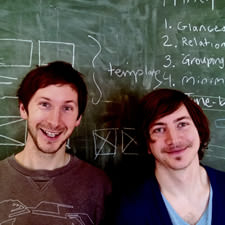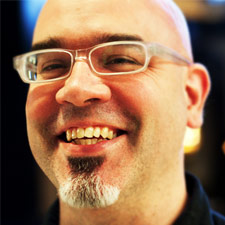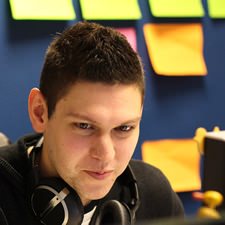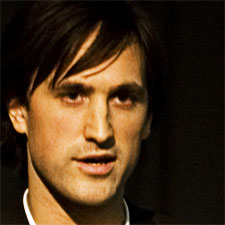Schedule
Three Days of Inspiring Talks and Workshops on Product Design, Behaviour Design and Design Strategy.
Product Design
08:00 ‐ 09:30
Registration
Morning Talks
09:30 ‐ 10:15
Design Disrupted
How the art of design is changing with shifts in technology, tools and participation. Tom will discuss some of the big trends effecting design and give examples of how designers might harness them to increase impact. This will draw on examples of IDEO’s work, OpenIDEO and some of his startup investments.
10:15 ‐ 11:00
Better product definition with Lean UX and Design Thinking
Teams should focus on creating a series of hypotheses that define potential solutions to their business problem business problem and then work together to learn which of these hypotheses are keepers and which ideas to kill.
11:00 ‐ 11:30
Mid-morning break
11:30 ‐ 11:50
London 2012: UX reflections on the first truly digital Olympics
This case study is about how we designed the UX of this digital Olympics, across mobile, tablet, desktop PC and connected TVs. And what we learned when we watched with avid curiosity as 55 million people used what we made over the 17 days of the games.
11:50 ‐ 12:10
Building a consistent user experience across government digital services
Ben will talk about the design of GOV.UK, picking a particular area and explaining how we use our Design Principles to build an idea into a live feature on the site.
12:15 ‐ 13:00
Radiators, letterboxes, cuckoo clocks and cars: the new computing
Computing power doubles every 18 months, so we’re now at the point where computing is cheap enough and good enough to embed it everywhere.
13:00 ‐ 14:00
Lunch
Afternoon Workshops
14:00 ‐ 17:30
15:30 ‐ 16:00
Mid-afternoon break
Where UX meets Business Strategy
As a UX designer, identifying the strategy driving a business is an archaeological process. You set out to work on a homepage re-design, but after many layers of what’s and why’s you find yourself immersed in business strategy rather than screen design.
Prototyping Touch
In this workshop, we’ll challenge the idea that the laptop or desktop & mouse should be our initial creation tool when designing for touch and through pairing sketching with various tools and apps available on iOS devices, we’ll tap, swipe, and pinch our way to touch prototypes.
Design a passion project in three hours using Lean Start-up methods
This is a structured and engaging way to “try on” design methods from the Lean UX / Lean Startup world and explore an idea that is personally meaningful. The techniques you’ll learn in this workshop are directly and immediately applicable to all kinds of UX design...in the enterprise, startups and mid-sized companies.
Tools for building Business Models and Value Propositions
Knowing the tools to have efficient, powerful conversations about business models and value propositions will give your clients more value, you more credibility, and your work more impact. This practical workshop will give you hands-on experience and the knowledge you need to apply it.
Designing Smart Things: the UX of ubiquitous computing and the Internet of Things
How do you design a user experience that transcends a single device? Ten devices, some of which may not have screens? How do you design for services that exist simultaneously in your hand and in the cloud? How do you redesign everyday objects to be "smart things" that connect to Web services?
Silverback: Get Usability Testing Now
Every Attendee Gets a Free Silverback Licence. Silverback is probably the world’s simplest usability testing software but let’s face it – clicking “record” isn’t the hard bit. It’s preparing for a session, knowing how to run it, and, most importantly, turning the findings into actionable insights that can improve the performance of your product.
Behaviour Design
08:30 ‐ 09:30
Registration
Morning Talks
09:30 ‐ 10:15
Ducks, dolls & robots: a genealogy of socio-technical anxieties.
The introductions of new technologies are rarely seamless and silent affairs. In this talk, Genevieve traces the roots of hopes, fears and anxieties back through our history with machines — Vaucason’s Duck, Edison’s Talking Doll, the tea-cup robots of the Edo-period in Japan, Frankenstein’s monster and Ned Ludd’s polemics are all part of this story.
10:15 ‐ 11:00
Magic Pixie Wonder Dust 3000 (Enterprise Edition): Designing for Playful Experiences
In this talk, you will learn why ‘engagement’ is bullshit; why there are no architecturalisation gurus (and soon will be no gamification ones), but designing for motivation is here to stay.
11:00 ‐ 11:30
Mid-morning break
11:30 ‐ 11:50
Big Screen, small details…
Antony and Jerome will take you on a journey when ribot worked with Tesco R&D to create their Endless Aisles project, which is now rolling out to multiple stores across the country.
11:50 ‐ 12:10
Designing addicted products
This is the story of Brad and a network of Addicted toasters, an experiment that explores the conversation between a product with its own goal and its owner and the implication coming from this product being part of a network of things and people.
12:15 ‐ 13:00
Reframing UX as a Profession
In this presentation, Peter argues that UX in the 21st century must be reframed a strategic and leadership role with a distinct organizational mandate.
13:00 ‐ 14:00
Lunch
Afternoon Workshops
14:00 ‐ 17:30
15:30 ‐ 16:00
Mid-afternoon break
Lean UX: Building a shared understanding to get out of the deliverables business
This workshop is for web designers (interaction, visual, etc) and the product managers and developers who work with them. You’ll take away practical skills to encourage greater team collaboration, rapid design tactics, shorter feedback loops and increased product validity all while increasing team productivity, efficiency and camaraderie.
Designing for Discovery with Faceted Navigation
This workshop covers principles of faceted classification and shows you how to use facets in web design. Many examples of faceted navigation will be presented and discussed. A clear, structured framework for understanding the individual components is presented to help you understand all the decisions involved. The topics are brought to life through several hands-on exercises.
Mapping the Experience
Experience maps offer a framework for mapping human experiences across multiple situations and interactions. These maps ensure that every occasion where your organization touches or connects with a person’s life is appropriate, relevant, meaningful, and endearing.
Responsive UX
Responsive design is a game-changer. It has already changed the way that front-end development is practiced. But it has equally earth-shifting implications for information architecture and interaction design. The workshop will help cross-disciplinary teams, particularly those looking to tackle large scale responsive redesigns or new builds.
The Principles of Social Design
With social experiences, it is debatable whether you should do research before designing, or whether it is better to design, ship, in order to learn and iterate. In the next 12-24 months, social design will become a key requirement for UX professionals and it will make us question our best practices.
Designing better experiences
This workshop delves into the core principles of user centred design and how it can help designers, developers and product owners build better experiences for their users. Through hands-on activities we will explore techniques for implementing a better and more agile UCD process from researching and gathering requirements to evaluating and refining your designs.
Design Strategy
08:30 ‐ 09:30
Registration
Morning Talks
09:30 ‐ 10:15
The Robot Curve
Today’s widespread unemployment is not a jobs crisis. It’s a talent crisis. Technology is taking every job that doesn’t need a high degree of creativity, humanity or leadership.
10:15 ‐ 11:00
From users to customers
Ben Reason will talk about how the livework team - many of whom have a UX background - have developed service design with specific focus on how digital changes services in a range of industries. With case studies from Telecoms, Public Sector and Transport Ben will show how designers can take a holistic view of the customer experience and the business goals and how this approach can improve UX design and digital solutions.
11:00 ‐ 11:30
Mid-morning break
11:30 ‐ 11:50
What happens when the agency doesn’t go home?
Tim will talk about Made by Many’s mission to invent, make and operate new digital products and services that are never finished. Moving beyond the traditional campaign cycle of ‘one night stands’ is an important new competence of clients and agencies alike and Tim will use real cases to share some of the ways MxM are trying to meet these challenges.
11:50 ‐ 12:10
Rebel Rebel: a case study on taking the opposite approach
In this case study, Hannah and Matt will share the thinking and process behind their product This Is My Jam, an unconventional approach to song sharing.
12:15 ‐ 13:00
The Rise of the Meta-Product
In the 21st Century, the world does not consist of digital equivalents of physical products and services. How designers cope with the new meta-product world order is the real question to be asked right now.
13:00 ‐ 14:00
Lunch
Afternoon Workshops
14:00 ‐ 17:30
15:30 ‐ 16:00
Mid-afternoon break
Task modelling: Understanding what people want and how to design for it
Richard is fascinated with the notion that we need to create spaces in which people can play in order to complete their tasks. This workshop will expand on this idea using theory, practical activities and case studies.
Learn Your ABCs: Apply Brand-driven Content Strategy
Brand-driven content strategy complements user-centered design, and this workshop will help you get up to speed on the philosophy, questions, tools, and exercises to implement it. We’ll conduct a hands-on exercise to prioritize communication goals and develop a message architecture—ideal whether you design for the web, mobile apps, social media, or offline experiences.
Mastering the Art of Participatory Design
Now more than ever, prospective users and clients are being drawn even deeper into our UX design process through the use of participatory design activities. These activities help designers better identify people’s needs, then generate and evaluate a range of design ideas—often in a playful and fun way that helps us rapidly construct and test design hypotheses for products or services.
Order Out of Chaos – Web Governance
In this half-day workshop, noted governance expert Lisa Welchman will explain how to create a web governance framework for your organization. She’ll offer practical steps for creating a complete set of Web policies and standards. Participants will leave with a detailed understanding of how to begin the process for creating Web governance frameworks for their own organizations.
The Five Talents
As you enter the Robotic Age, the first question to ask yourself is not how talented you are, but how you are talented. Every creative person has a special set of abilities that both suggest and limit what he or she can achieve.
Inclusive User Experience
As designers, we can apply variety of techniques to ensure we deliver a design experience that provides an equivalent level of quality to as many people as possible. “Inclusive User Experience” is putting digital liberty as a number one priority.
Reasons to attend
- 1Spend 3 whole days improving your UX skills
- 2Meet your peers and share new ways of thinking
- 3See world class speakers from the UX industry
"I came. I listened. I stayed. Great event, great crowd, great venue. Learn, network, enjoy."
Don Norman Speaker at UX London 2009






































